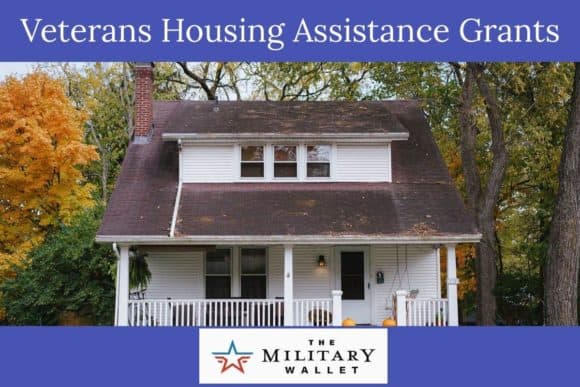Table of Contents
While most service members are familiar with VA Loans, they are just one type of housing assistance available to veterans. They can also receive financial aid through housing assistance grants, which help qualifying service members with disabilities purchase or renovate homes to meet individual needs.
In this guide, we take a closer look at different types of housing assistance grants available to veterans and provide an overview of:
- Eligibility criteria
- Funding amounts
- Application instructions
What are Housing Assistance Grants?
In general, housing assistance grants are funds available to veterans for home-related expenses. Some of the major housing assistance grant programs, such as the VA’s Specially Adapted Housing (SAH) grant, the Special Home Adaptation (SHA) grant and the Temporary Residence Adaptation grant — which are profiled below — are exclusively for veterans with service-related disabilities.
These grant programs have strict eligibility criteria and an annual cap on the number of grant recipients.
Another housing assistance grant program is the Home Improvements and Structural Assistance (HISA) grant, which does not require that the veteran have a service-connected disability to qualify. The HISA grant provides medically necessary improvements (e.g. roll-in showers, permanent ramping, lowered countertops, etc.) and structural changes to a disabled veteran’s primary home. This grant does not cover certain home alterations, such as whirlpool bathtubs, home security systems or non-permanent structures.
Housing Assistance Grants for Service-Disabled Veterans
Specially Adapted Housing Grant
The Specially Adapted Housing grant is for veterans with service-connected disabilities who plan to use the funds to buy, build or make alterations to their permanent homes. In order to qualify for the SAH, the veteran must own (or plan to own) the home and have a qualifying service-connected disability, such as:
- The loss or loss of use of more than one limb
- The loss or loss of use of a lower leg along with the lasting effects of a natural disease or injury
- Blindness in both eyes along with the loss or loss of use of a leg
- Certain severe burns
- The loss or loss of use of one lower extremity (foot or leg) after Sept. 11, 2001, that inhibits balance or walking without the help of braces, crutches, canes or a wheelchair
Note: There is a cap on the number of SAH recipients. Only 30 veterans and service members can qualify each fiscal year for this grant.
Here is a video overview:
Special Home Adaptation Grant
The Special Home Adaptation grant also provides funding for veterans with service-connected disabilities; however, the overall funding amount is lower, and the qualifying disabilities are different than the Specially Adapted Housing grant. Just like its SAH sister-grant, the SHA grant is intended for veterans who will use the funding to buy, build, or make alterations to their permanent homes.
An important differentiator, though, is that this grant can be used for a home owned by (or soon to be owned by) the disabled veteran or a family member. Also, for this particular grant, the list of qualifying service-connected disabilities is slightly different and includes:
- Blindness in both eyes (20/200 visual acuity or less)
- The loss or loss of use of both hands
- Certain severe burns
- Certain respiratory or breathing injuries
Temporary Residence Adaptation Grant
The third VA-sponsored housing assistance grant is the Temporary Residence Adaptation grant, which enables veterans to make adjustments to a temporary home (or the home of a family member) as opposed to a permanent residence. Like the SAH and SHA grants, the TRA grant is intended for veterans with qualifying service-connected disabilities, although they need not own or plan to own a home in order to qualify.
Eligibility Criteria
The eligibility criteria for all three VA-sponsored housing assistance grants differ slightly depending on the particular program. Still, the main requirement is having a qualifying service-connected disability as defined by the Department of Veterans Affairs.
Also, while the SAH and SHA require that the veteran (or a family member, for the SHA) either own or plan to own a home, the TRA grant is not based on homeownership.
To qualify for a TRA grant, the veteran must meet the service-connected disability criteria for either the SAH or SHA grant (see the previous section) and be living temporarily in a family member’s home that requires changes to meet individual needs.

Check your VA Home Loan eligibility and get personalized rates. Answer a few questions and we'll connect you with a trusted VA lender to answer any questions you have about the VA loan program.
How Much Funding is Provided?
For Fiscal Year 2021, the maximum total funding amounts are:
Specially Adapted Housing (SAH) grant: Up to $100,896.
Special Home Adaptation (SHA) grant: Up to $20,215.
Temporary Residence Adaptation (TRA) grant: Up to $40,637 if veteran qualifies for SAH grant; up to $7,256 if veteran qualifies for SHA grant.
Home Improvement and Structural Alterations (HISA) grant: Up to $6,800 for veterans and service members with service-connected disabilities or for veterans with non-service-connected conditions rated 50% or more service-connected; Up to $2,000 for veterans with non-service-connected conditions.
Keep in mind that grant recipients do not have to use the total grant amount in a given year; instead, they can draw from the funds up to three different times in future years.
How to Apply for Housing Assistance Grants
The application process for VA-sponsored housing assistance grants is pretty straightforward. The application can be completed online via the VA’s eBenefits portal or by mail to the closest VA regional loan center. Alternately, veterans can reach out directly to the VA by calling 800-827-1000. After the application is submitted, veterans will be notified of the VA’s decision via mail or through the eBenefits portal.
However, for the HISA grant, the process is a bit more complex. In addition to completing an application form, the veteran has to provide a written prescription from a VA physician, providing a detailed overview of why the home improvement or structural alteration is merited, as well as a written itemized estimate for the cost of labor, materials, permits and potential inspections for the home alteration.
For a more detailed overview of VA-sponsored housing assistance grants, view the full guidebook here.




Comments:
About the comments on this site:
These responses are not provided or commissioned by the bank advertiser. Responses have not been reviewed, approved or otherwise endorsed by the bank advertiser. It is not the bank advertiser’s responsibility to ensure all posts and/or questions are answered.
Paul says
I’m 100% permanent and complete yet don’t qualify for ssd or adaptive housing bc I am able to walk. I am not slighting my brothers and sisters who have lost limbs or sight. Just frustrated as I am treated like the middle child.